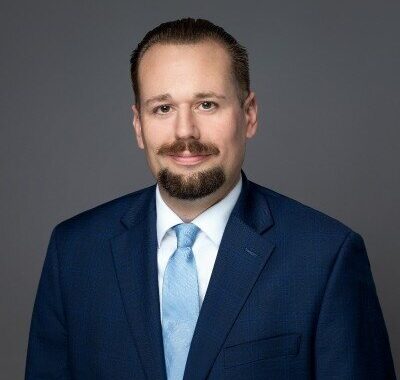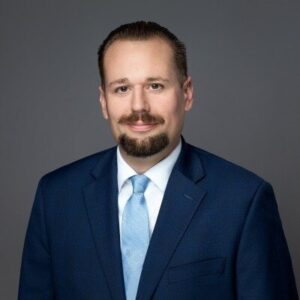By Andrew Adler
Community Editor
The Jewish Federation of Louisville has hired Trent Spoolstra, currently Associate Regional Director of Anti-Defamation League Midwest, as the new director of the Federation’s Jewish Community Relations Council. He takes over early next month from Matt Golden, who is shifting to a part-time Federation role – Chief Strategy and Impact Officer — since becoming JCRC head in October of 2022.
JCRC is the principal liaison between the Federation, Louisville’s Jewish Community, and the community at large, which makes its director – in many key respects – the public face of the organization. Golden was the first full-time JCRC here, and under his watch has made a special point of reaching out to diverse faith collectives, building relationships with an array of area churches and mosques. He’s also devoted considerable energy addressing rising antisemitism – initiatives made even more relevant amid a post-October 7 environment.
Under a newly restructured senior leadership hierarchy, Spoolstra will report to Golden, with the two collaborating on how best to hone the Federation’s message amid an ever-challenging environment.
“Matt opened the door wide for us to see what it would look like and feel like to expend double the energy than we’d ever been able to in this area,” explained Sara Klein Wagner, President and CEO of the Federation and the Trager Family JCC. “So when we started this search again, we knew we needed ti find a professional who could help build on how we approach community relations” — whether here, in Frankfort (where Golden was a particularly strong voice), wherever the Federation’s collective voice needs to be heard. “We’re very lucky we found whose experience has been in a national Jewish organization,” Wagner said of Spoolstra, “because he has such a large perspective on what’s going on in North America.”
With that context in mind, Spoolstra’s ADL involvement has equipped him to meet potentially divisive challenges head-on at JCRC, with a constant eye toward remaining deliberately and consistently objective.
“My job is to remain non-partisan,” he emphasized during a recent interview, speaking via Zoom from his Chicago office. “Whether extremism comes from some group on the far left or the far right doesn’t matter — it’s antisemitism.”
The fundamental imperative, Spoolstra observes, is “how you go about confronting it.”
“There’s a kind of national movement right now in the American Jewish community of figuring out how we re-engage with (our) coalition partners. How do we change the narrative to understand that? Yes, there was a terrorist attack against Israel half a world away that affects American Jews here. When you’re talking about antisemitism, it has to be fought on both sides.”
Spoolstra agrees that it’s vital not to mistake American Jews simply as a collective that thinks one way, regardless of the issue. “The American Jewish community is not a monolith,” he says. “There are religious observance differences. There are ethnic differences. There are national differences.”
Still, Spoolstra sees “a silver lining in the gray cloud” – disparate Jewish constituencies determined to unite to oppose forces that could undo them. “Different synagogues and organizations speaking together, in one voice saying we will not tolerate antisemitism.”
As a prime example, he cited a press conference earlier in the week, coordinated by ADL Midwest director David Goldenberg. The gathering included representatives from the local Federation, the Simon Wiesenthal Center and the American Jewish Committee – in Spoolstra’s words, “all talking about heading to the DNC (Democratic National Convention) in Chicago,” when large-scale protests against the war in Gaza were expected.
He joined ADL Midwest in June of 2021, with a mandate (according to his LinkedIn page) “to counter antisemitism/anti-Zionism across five and a half states and develop the next generation of ADL Midwest leaders.”
Spoolstra is bringing his own brand of energy to his new position. “He’s got great experience, enthusiasm and willingness to just listen,” said JCRC Chair Beth Salamon, citing Spoolstra’s ADL tenure, plus his background as a teacher and Hillel advocate. “I think they are going to be his great strengths.”
Coming in as JCRC director, Spoolstra will build on a mission already well established. “How we go about achieving that mission may be tweaked a bit and maybe streamlined a bit,” Salamon said, “but our core values will stay the same.”
Born in Indianapolis, Spoolstra (the name reflects his father’s Dutch heritage) graduated from the University of Notre Dame in 2013 with a B.A. in Political Science, going on to earn a M.A. in International Relations and Affairs from Texas A&M University’s Bush School of Government and Public Service in 2020. In between he spent a year in South Bend with AmeriCorps-Vista as an Abandoned Housing Specialist, and two years as a Junior Investment Analyst/Implementation Specialist in the Indianapolis area.
Embarking on “a spiritual journey,” Spoolstra found himself drawn to perspectives of Jewish belief. “I knew the basics of Judaism,” he recalls, “and started delving more into it. It was a religion that just clicked for me. I think I was just at the right place and the right time in my life.”
Thus empowered, Spoolstra began a formal course of conversion preparation. “I studied under a rabbi at the local synagogue in South Bend,” he says, “and went through a class that met once a week on Monday nights.”
It took a while locating an appropriate mikvah to complete his conversion – there were none in South Bend, so he had to travel to a Chicago suburb in order to fulfill the traditional conversion process.
Now, nine years later, Spoolstra’s personal Judaism has expanded in scope – both spiritually and practically. “What I’ve learned on my Jewish journey is that Judaism is not just a religion. It’s not just an ethnicity. It really is a peoplehood. It was made clear when I was becoming Jewish that I was joining a people. And that was something that really resonated with me.”
Though he considers himself part of the Conservative movement, Spoolstra has eagerly embraced the intrinsic diversity of his adopted faith. Besides being active in Texas A&M’s Hillel chapter, “I’ve gone to Sephardic high holiday celebrations. When I was in Israel, I visited with Ethiopian communities. I can go to an Orthodox synagogue; I can go to a Sephardic synagogue. At the end of the day, we’re all Jews.”
As a young adult professional, Spoolstra is ideally positioned to build relationships with Jewish college students. “Here at ADL, I’m winding down partnerships I have with seven or eight different Hillels,” he says, with a broad portfolio that included “doing check-ins (with students), going to their annual events, or setting up training to understand and identify antisemitism and anti-Zionism. I look forward to continuing to do that” with the JCRC in Louisville.
“I want to have a solid relationship and let them know that JCRC is here for them” Spoolstra says. Stress levels have risen sharply among many Jewish college students, who’ve had to run the gauntlet of encampments and protests steeped in ugly, hateful rhetoric.
“The typical things college students worry about – whether you’re Jewish or not – are exams, getting into this fraternity or sorority, or living on your own for the first time. The last thing a Jewish student should have to worry about is antisemitism.”
It’s an A-to-Z challenge: Antisemitism in one breath, Zionism in another. The latter has become something of anathema among those who equate it with a bitter variation on apartheid colonialism.
“A lot of it comes from a place of ignorance,” Spoolstra believes, “from people who don’t know what that term really is. So if you’ve seen a TikTok or Snapchat video, or something on Facebook, and you attribute Zionism as evil. I mentioned this to students a couple of weeks ago, that there are people who equate Zionism with racism, white supremacy and colonialism, and it’s like: ‘Well, if that’s what Zionism was, who would be a Zionist?’
“Part of being a JCRC director – about being a Jewish professional – is that Zionism is not a dirty word,” Spoolstra emphasizes. “We know from Pew Research Center polls about American Jews, that the vast majority base their definition of Zionism on the belief that the State of Israel has a right to exist, and that Jews have a right to self-determination. There are about 80 to 85 percent of American Jews who agree with that statement. There are millions of Americans who would agree with that statement as well. We need to own that word again.”
Indeed, “we need to tell people, ‘You can be a Zionist and disagree with the Israeli government. You can be a Zionist and not like every single thing the Israel Defense Forces, or certain members of Israeli society, are doing. So I think that part of the American Jewish community reclaiming that word is saying, ‘No, it’s not an ugly word. It’s not a dangerous word. It’s powerful.” nte




